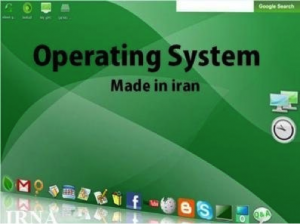The National Operating System
The other means employed by the Iranian government to spread the use of its SSL security certificates is through the national operating system, “Zamin” (or Earth). Zamin was jointly developed by the Information Technology Organization and the Iran Telecom Research Center and released as an open source platform in November 2012. As with the national browser, the authorities have built the SSL security certificates into the national operating system, and Zamin will not recognize Iran’s SSL certificates as invalid.
Work on Zamin has been underway for a number of years. The group that designed and documented Iran’s national operating system, the National Strategic Headquarters for Open Source Systems, was originally set up at the Office of Technological Cooperation in the presidential palace during Ahmadinejad’s administration. On April 28, 2010, Hamid Reza Rabiee, an adviser at the national operating system development project, said that the documentation for Zamin was in the final stages of preparation and had been approved by the Cabinet, clearing the way for its legal institutionalization and for the changeover of government computers from Windows to the national operating system.
The first phase of the launch of Zamin was completed with the development, in November 2012, of the desktop version of the Zamin operating system, which was based on the open source operating system Linux. On November 8, 2012, the Iran Telecom Research Center announced that data centers for the Zamin operating system would be established at Iranian universities.
Iranian officials had promised to launch the second phase of the Zamin system with cloud data processing compatibility and an operating system for hand-held devices by April 2013, but implementation has been behind schedule. Meanwhile, the use of the Windows operating system was banned in government offices on September 9, 2013. The state broadcasting news agency reported that the government directive required the change from Windows to Linux to be implemented within six months. However, while there has been no information on implementation of the directive, it would be technically impossible to carry it out within such a short time frame.
Delays notwithstanding, government efforts on Zamin have been continuing steadily, and the full implementation of such a state-controlled system, in the absence of a legal framework to protect individual privacy, will mean that Internet users in Iran will be effectively sharing their information with the country’s security, intelligence, and judicial agencies.







